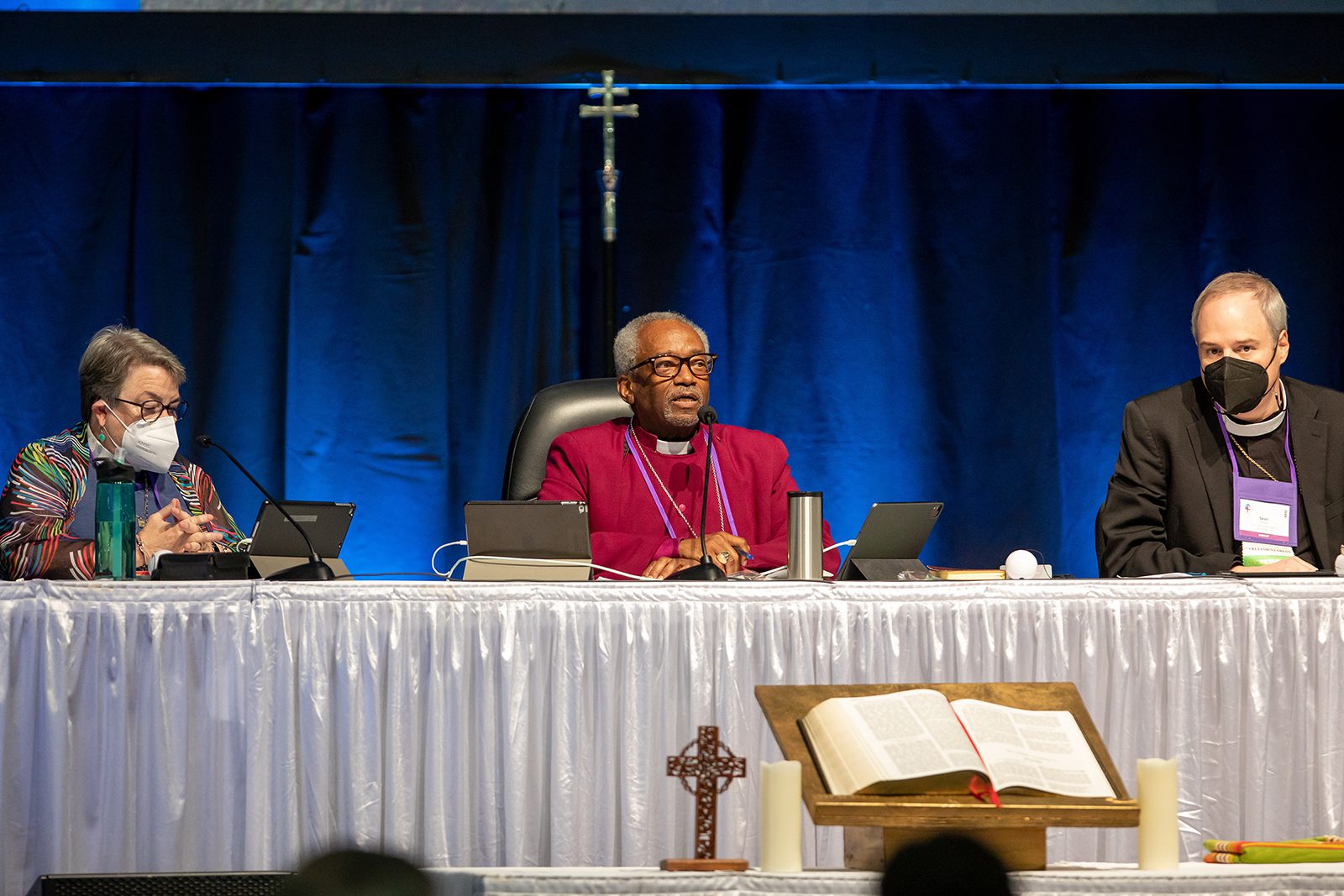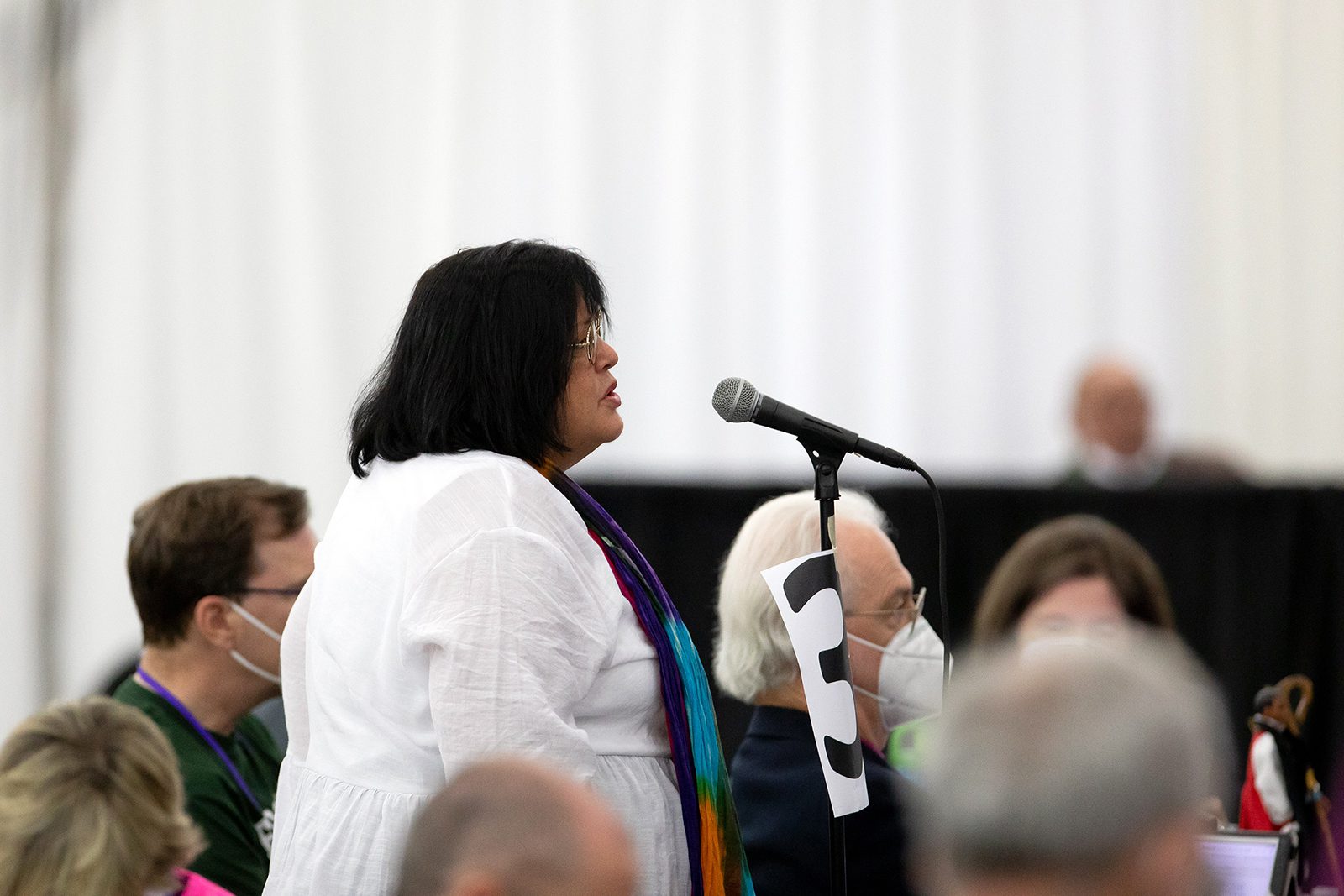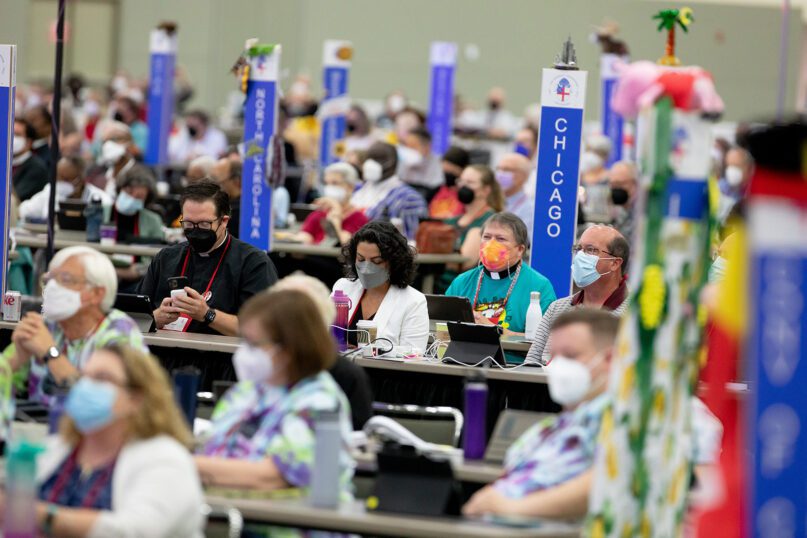(RNS) — The Episcopal Church will create a fact-finding commission to research the denomination’s role in the federal Indian boarding school system that separated generations of Indigenous children from their families and cultures in the 19th and 20th centuries.
Bishops and deputies at the mainline denomination’s scaled-back General Convention approved the Resolution for Telling the Truth about The Episcopal Church’s History with Indigenous Boarding Schools over the weekend in Baltimore.
The resolution encourages the Episcopal Church to hire one or more research fellows to work with dioceses where Episcopal-run boarding schools for Indigenous children were located and share records with the Indigenous Ministries of the Episcopal Church and the National Native American Boarding School Healing Coalition.
It also directs the denomination’s archivists to create educational resources about the schools and encourages dioceses where boarding schools were located to gather information from survivors and their descendants about their experiences.
In addition, the House of Deputies — which, with the House of Bishops, oversees the church — elected an Indigenous clergywoman, the Rev. Rachel Taber-Hamilton, as its vice president. A member of the Shackan First Nation and a priest in the Diocese of Olympia, Taber-Hamilton is the first ordained woman — and only the third woman — to serve in that role, according to Episcopal News Service.
She was elected alongside President-elect Julia Ayala Harris, a Latina laywoman from the Diocese of Oklahoma. Their election marks the first time two women and two people of color will lead the house.
RELATED: Department of Interior releases first report detailing US Indian boarding schools
Those actions come as U.S. Interior Secretary Deb Haaland kicks off “The Road to Healing,” a national listening tour in which the secretary will hear from survivors of boarding schools in the United States. Haaland’s department recently released the first volume of an investigative report into the country’s Indian boarding school system.
And, at the end of July, Pope Francis will travel to Canada to offer an apology to survivors of similar residential schools in that country, after the pontiff received representatives of Canadian Indigenous people at the Vatican in early April.
“This is a moment for us to really examine how we as a church might look at the ramifications of our unintentional sometimes and sometimes intentional acts of culturalism, racism and every other sin we could talk about,” Bishop Carol J. Gallagher told the House of Bishops before its vote on the resolution.
The Episcopal Church’s General Convention, normally held every three years, was already delayed a year by the COVID-19 pandemic, and the meeting that ended Monday (July 11) was shortened from eight days to four to minimize risks of spreading the virus.

Bishop Michael Curry presides over the House of Bishops during the Episcopal Church General Convention, July 9, 2022, in Baltimore. Photo by Randall Gornowich
Presiding Bishop Michael Curry urged committees working ahead of the in-person gathering to focus on resolutions on “matters essential for the governance and good order of the church,” according to Episcopal News Service. The resolution on Indigenous schools rose to that level.
The federal Indian boarding school system was part of an effort by the U.S. government to assimilate Indigenous peoples and seize their land, according to the Interior report. Many children endured physical and emotional abuse in the schools, and some died.
Members of both the House of Bishops and House of Deputies spoke unanimously in favor of the resolution. Some shared their experiences officiating at funerals for children whose remains had been repatriated from the former Carlisle Indian School in Pennsylvania. Others spoke of pushing the city of Alberquerque to acknowledge that children had been buried beneath a public park constructed on the former site of a Presbyterian-run boarding school.
Still others shared their experiences as boarding school survivors themselves, or descendants of survivors.
Deputy Ruth Johnson of the Navajoland Area Mission attended two boarding schools — an experience, she told the House of Deputies, that is still hard for her to talk about.
At the first school, Johnson said, she was traumatized when she became ill and her long hair was cut. At the second, she was beaten. “I could have easily been one of those that didn’t make it home,” she said.
Gallagher, a member of the Cherokee Nation who serves the dioceses of Massachusetts and Albany, said her grandfather was a boarding school survivor. Her family still talks about a visit her parents made to a boarding school when she was a baby where children who hadn’t seen their mothers in years climbed into her mother’s lap, she said.

Bishop Carol J. Gallagher, regional canon for the Central Region of the Diocese of Massachusetts, speaks during the Episcopal Church General Convention in Baltimore. Photo by Randall Gornowich
Some of those children never saw their families again, she said.
“For Indigenous people, listening is always the first step and really hearing the stories and living into the stories and working towards a consensus of what will be come next,” Gallagher told Religion News Service.
“Oftentimes, churches want to do some quick fix, and that is not going to get us anywhere.”
That’s why the resolution approved at General Convention is important, she said.
RELATED: Catholic, Protestant groups support commission on US Indian boarding school policy
The Resolution for Telling the Truth about The Episcopal Church’s History with Indigenous Boarding Schools again expresses the denomination’s support for federal legislation creating a Truth and Healing Commission to reckon with the country’s history of boarding schools similar to Canada’s Truth and Reconciliation Commission.
It also incorporates language from a second resolution acknowledging the intergenerational trauma caused by the schools and directing the denomination to support community-based spiritual healing centers in Indigenous communities.
The denomination has budgeted $225,000 for that work.
“This is important work, and it’s for all of us,” Bishop Mark Lattime of the Diocese of Alaska said.
“You might think your diocese doesn’t have a history of boarding schools with Indigenous people, and — while that might be true — there isn’t a diocese in this church that doesn’t have a history with Indigenous people.”
Despite precautions, 26 people still tested positive for COVID-19 at the convention, according to Episcopal News Service. Other denominations also have seen some COVID cases as they’ve resumed in-person meetings this summer, including the Southern Baptist Convention, the Presbyterian Church (U.S.A.) and the Christian Methodist Episcopal Church.





